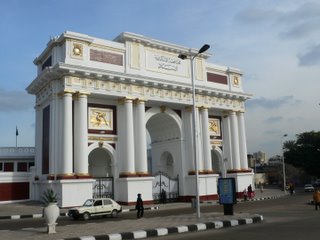 Have you ever arrived at a stadium nearly 5 hours before the start of a game ?
Have you ever arrived at a stadium nearly 5 hours before the start of a game ?Probably not - in the English Premier League most supporters take their seats 5 minutes before kick off.
I took my well rehearsed route from my Giza hotel i.e. communal minibus (0.5 LE = 5p), metro (0.75LE = 7.5p) and 30 minute walk all done on a bright sunny day - similar to May in the UK. Except this was February in Cairo and Egypt were in the Final.
In Africa at the Nations Cup Final you never quite know what to expect and hence my over cautious approach - to ensure a good seat (tickets don't allocate specific seat numbers) and to be there well in advance of Mr Mubarak - whose presence meant all spectators had to been inside the stadium some 3 hours before the start. It was the first time I had seen the groundsmen mowing the grass before a game.
You need plenty to read, a good supply of nibbles (nuts in my case) and adequate water.
Fortunately the atmosphere generated by the local supporters meant the time did pass reasonably quickly.
As in many finals the game was not a classic but it did have drama. The pattern of the first half saw Egypt attack and Ivory Coast generally content to defend and play for breakaways. Not too many clear cut chances occurred.
The second half revolved around 3 significant moments - two misses by Drogba (one of which was a relatively easy opportunity) and a much disputed penalty after Barakat was brought down by Bouassi. Previously (and subsequently) reliable Egyptian captain Ahmed Hassan hits the post with the spot kick and Ivory Coast clear the ball.
The 90 minutes thus ends goalless with the Egyptians shading possession although the Ivorians with the solid presence of Drogba continued to threaten.
Extra time, as is often the case, fails to provide a winner and we go into the penalty shoot out.
This time the Egyptian captain scores decisively whereas Drogba (and Kone) have their efforts saved by the excellent El Hadary in the Egyptian goal.
It falls to Abu Treka to score the clincher and set off the great celebrations.
Egypt had kept their nerve , had played with great determination, no little skill and had overcome some drama (especially involving Mido) along the way to a deserved win.
Mr Mubarak does the honours as the (prolonged) presentations are made in front of his glassed-off VIP area to end a very successful tournament for the home team.
After a brief delay (again for HM to depart) I made the fastest way back to the hotel - the taxi making good time until we neared the Giza area where the density of traffic and general mayhem made any progress extremely slow - so I walked the remaining distance and had plenty of opportunity to appreciate the noisy, exuberant but peaceful (and presumably non-alcohol fueled) street celebrations.
Before returning to the UK I joined the tourist groups and visited the Pyramids , the impressive Egyptian Museum and the Cairo Citadel whilst fending off hustlers, negotiating with taxi drivers (Cairo is a big city and many sites are inaccessible by public transport) , enduring the pollution and managing to stay alive when crossing the road.
No question Egypt is a country of contrasts having within its midsts the relics of the dawn of civilisation and also a population that often has an everyday struggle to scratch out an existence.
And its interesting how you get used to seeing the local (Muslim) women with their heads (and often everything else) covered ,the women-only Metro carriages (often a riot of pastel coloured headscarves) and the dearth of bars. No bear midriffs or mini-skirts (or drunks) in sight.
So the African Nations Cup was won by the modern day Pharoahs in a place not too far from where their very successful namesakes' wonderous burial monuments were built some 4000 years ago.
